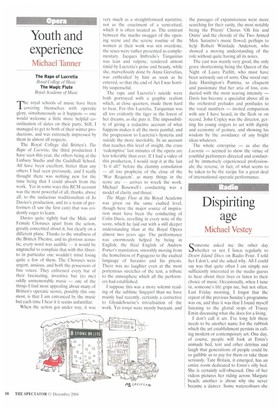Youth and experience
Michael Tanner
The Rape of Lucretia Royal College of Music The Magic Flute Royal Academy of Music
rr he royal schools of music have been covering themselves with operatic glory, simultaneously as it happens — one would welcome a little more helpful coordination of dates on their parts. Still, I managed to get to both of their winter productions, and was extremely impressed by them in almost all respects.
The Royal College did Britten's The Rape of Lucretia, the third production I have seen this year, the others being at the Linbury Studio and the Guildhall School. All have been excellent, better than any others I had seen previously, and I really thought there was nothing new for the time being that I could absorb from the work. Yet in some ways this RCM account was the most powerful of all, thanks, above all, to the audacious traditionalism of Jo Davies's production, and to a team of performers (I saw the first cast) that was evidently eager to learn.
Davies quite rightly had the Male and Female Choruses apart from the action, greatly concerned about it, but clearly on a different plane. Thanks to the smallness of the Britten Theatre, and its glorious acous tic, every word was audible it would be ungrateful to complain that with this libretto in particular one wouldn't mind losing quite a few of them. The Choruses were urgent, anxious, and both the possessors of fine voices. They enlivened every bar of their fascinating, inventive but (to me) oddly unmemorable music — one of the things I find most appealing about many of Britten's operatic scores, possibly this one most, is that I am entranced by the music but each time I hear it it seems unfamiliar.
When the action got under way, it was very much as a straightforward narrative, not as the enactment of a semi-ritual, which it is often treated as. The contrast between the macho swagger of the opening scene and the serene routine of the women at their work was not overdone, the sexes were rather presented as complementary. Jacques Imbrailo's Tarquinius was lean and vulpine, rendered almost timid by Lucretia's poise and beauty, while she, marvellously done by Anna Grevelius, was enthralled by him as soon as he entered, so that the end of Act I was horribly suspenseful.
The rape and Lucretia's suicide were both portrayed with a graphic realism which, at close quarters, made them hard to bear. For this Lucretia, Tarquinius was all too evidently the tiger in the forest of her dreams, as she puts it. The impossibility of giving a reductive account of what happens makes it all the more painful, and the progression to Lucretia's hysteria and suicide the more inevitable. In an account that reaches this level of insight, the crass 'redemptive' last minutes of the opera are less tolerable than ever. If I had a video of this production, I would stop it at the last 'Is it all?' before the clammy consolation — all too prophetic of the close of the 'War Requiem', as many things in the score are — arrives to wreck the work. Michael Rosewell's conducting was a model of clarity and thrust.
The Magic Flute at the Royal Academy was given on the same exalted level, though here the major source of inspiration must have been the conducting of Colin Davis, revelling in every note of the score, which he laid out with a still deeper understanding than at the Royal Opera almost two years ago. The performance was enormously helped by being in English, the fluid English of Andrew Porter's translation, smoothly moving from the homeliness of Papageno to the exalted language of Sarastro and his priests. There was no laughter even at the most portentous stretches of the text, a tribute to the atmosphere which all the performers had established.
I suppose this was a more solemn reading of the sublime Singspiel than we have mainly had recently, certainly a corrective to Glyndebourne's trivialisation of the work. Yet tempi were mostly buoyant, and the passages of expansiveness were more searching for their rarity, the most notable being the Priests' Chorus 'Oh Isis and Osiris' and the chorale of the Two Armed Men. Sarastro's music flowed, perhaps to help Robert Winslade Anderson, who showed a moving understanding of the role without quite having all its notes.
The cast was mainly very good, the only grave shortcoming being the Queen of the Night of Laura Parfitt, who must have been seriously out of sorts. One stood out: Jane Harrington's Pamina, so eloquent and passionate that her aria of loss, conducted with the most searing intensity — Davis has become a specialist above all in the orchestral preludes and postludes to the vocal numbers — invited comparison with any I have heard, in the flesh or on record. John Copley was the director, getting his young singers to act with dignity and economy of gesture, and showing his wisdom by the avoidance of any bright ideas whatever.
The whole enterprise — as also the Lucretia — seemed to show the virtue of youthful performers directed and conducted by immensely experienced professionals; the reverse, in fact, of what seems to be taken to be the recipe for a great deal of international operatic performance.










































































 Previous page
Previous page